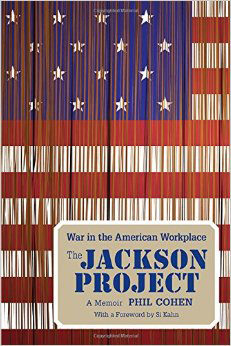
WASHINGTON (PAI) — When it comes to unions and Republican President-elect Donald Trump, veteran organizer Phil Cohen has a short and blunt warning: “Prepare for the worst.”
And, adds Cohen, who battled some of the worst firms in the country in his years of organizing textile workers in the rabidly anti-union South, that means training your members and their allies in how to battle the worst, too.
Cohen drew on his decades of experience in Southern organizing, particularly in Jackson, Miss., to comment on how workers should confront the millionaire mogul. Cohen’s detailed that experience in a new book, The Jackson Project, which he discussed at the AFL-CIO on Dec. 6.
In his career with the Amalgamated Clothing and Textile Workers, Cohen traveled all over the South, organizing workers in that industry in the most-hostile environment possible. Hate was so bad that Cohen slept with a gun near his pillow, and carried it while on the job.
And he wasn’t the only one. “In one case, a business agent for ACTWU was blown away by a shotgun during a strike,” Cohen said. He called organizing in textiles—an industry that now almost doesn’t exist in the U.S.—“desperate and dangerous.”
As for Jackson, “It had a history of really bloody labor riots,” Cohen notes. And ACTWU around the South was strong in citadel cities, but surrounded by such hostility elsewhere that workers and organizers did not feel safe.
“I wanted to convey to the average person what we feel” when organizing and defending ourselves in the union movement, he explained. “I wanted to convey the feel of a union campaign as it unfolds, day to day, point A to point B. Organizing is organizing.” By contrast, “The majority of books about unions are written by outside intellectuals.”
This one is written from his own experience and that of the workers he aided.
It’s that experience, Cohen said—especially at a plant in Jackson that changed hands three times in one year, going from an “owner that didn’t like unions” to an hostile owner to a “flat-out union buster”—that gives him the background for his advice about confronting Trump.
But it’s complicated by the fact that nobody, not even Trump, knows which way Trump will jump. The president-elect, Cohen says, has just one goal at heart: To do what’s best for Donald Trump.
If that means leaving unions alone, he’ll do so. If it means trying to destroy them, he’ll do so. So union members and allies must prepare for that worst scenario, Cohen warns.
“Even George W. Bush had some values” linked to the Constitution and the laws, Cohen said of the prior anti-union Republican president. Trump, he says, may not.
“The worst” could include Trump joining congressional Republicans in advocating a national right-to-work law, which would trash union finances. The 2016 Republican platform advocates such a law.
But that move would pale against the ultimate GOP scheme, Cohen warns: Repeal of Section 7 of the National Labor Relations Act, the key language in the nation’s basic labor law that explicitly gives workers the right to organize for their own protection.
“If he (Trump) thinks it’s to his advantage to wipe us off the face of the earth, that’ll be an apocalypse” for unions – and workers must prepare to battle that prospect, Cohen adds.
Workers’ preparation must create a “campaign to make it in his (Trump’s) best interests to stand down” from trying to destroy organized labor. It means each worker must be “a consummate warrior” ready to “fight ruthlessly” for the cause, but without hatred, as hatred sets you back into the past.
And it means constructing a campaign with, among other things, entertainment value and even a dash of humor, because that’s what wins people to your side, Cohen said. That entertainment emphasis helped Trump win the electoral vote that will put him in the White House on Jan. 20, Cohen commented. But Trump also stressed down-to-earth themes.
“We’ll have to teach our ground troops – from student activists to our own members – how to be deliberate and committed, and how to keep our emotions out of it,” Cohen said.










